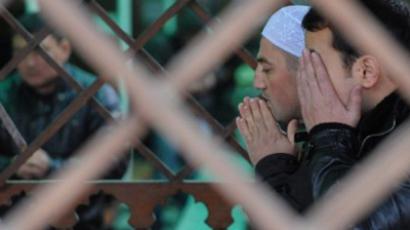Kyrgyz headscarf of discord
Can the state force Muslim women not to wear a veil in public? The debate is as hot in France and Turkey as it is in Central Asia’s Kyrgyzstan. The country is facing a rise of conservative Islam, with its restrictions, which worries many people.
RT’s Oksana Boyko spoke to Rahat, a 14-year-old Kyrgyz Muslim, who had to leave her school because she was not allowed to wear the traditional veil there. Eventually she transferred to an Adult Learning Center, which tolerates the strict dress code, but has far lower educational standards.“I personally know many girls who are Muslims like myself and who, faced with the ban on head cover, just had to quit schools altogether and now stay at home,” she told RT.The school’s authorities would not comment to RT on the allegation of persecution on the grounds of religion. This is, however, just one side of the coin.Rahat’s example is one of many, showing the growing tension in Kyrgyzstan over religious rules. The former Soviet republic had long adhered to a moderate brand of Islam, intermixed with local nomadic traditions and beliefs. But it has witnessed a dramatic rise of conservative Islam over the past decade.The country of 5.5 million people already has around 2,000 mosques. The state has little control over, or even understanding of, what is being preached in them.“Up to 80 per cent of new mosques were built through some sort of partnership with Arab countries, mainly Saudi Arabia or Qatar. And they provide more than money. They export their ideology here. We already have politicians calling for the creation of a caliphate,” says Armen Sharshenov from the State Committee on Religious Affairs.This rapid change of cultural and religious norms worries many of the country's liberals. One of them is Gulnara Ibrayeva, who teaches social sciences at Kyrgyzstan's most prestigious university. She says she was a strong supporter of religious freedom, but now she fears aggressive Islamification of her home country. “My country has changed. It's now a country where I can't tell anyone how to live their life, but Muslims feel they can,” she explained.Gulnara and many others fear that, if things go the same direction, it will be just a matter of time before basic human rights are done away with.














